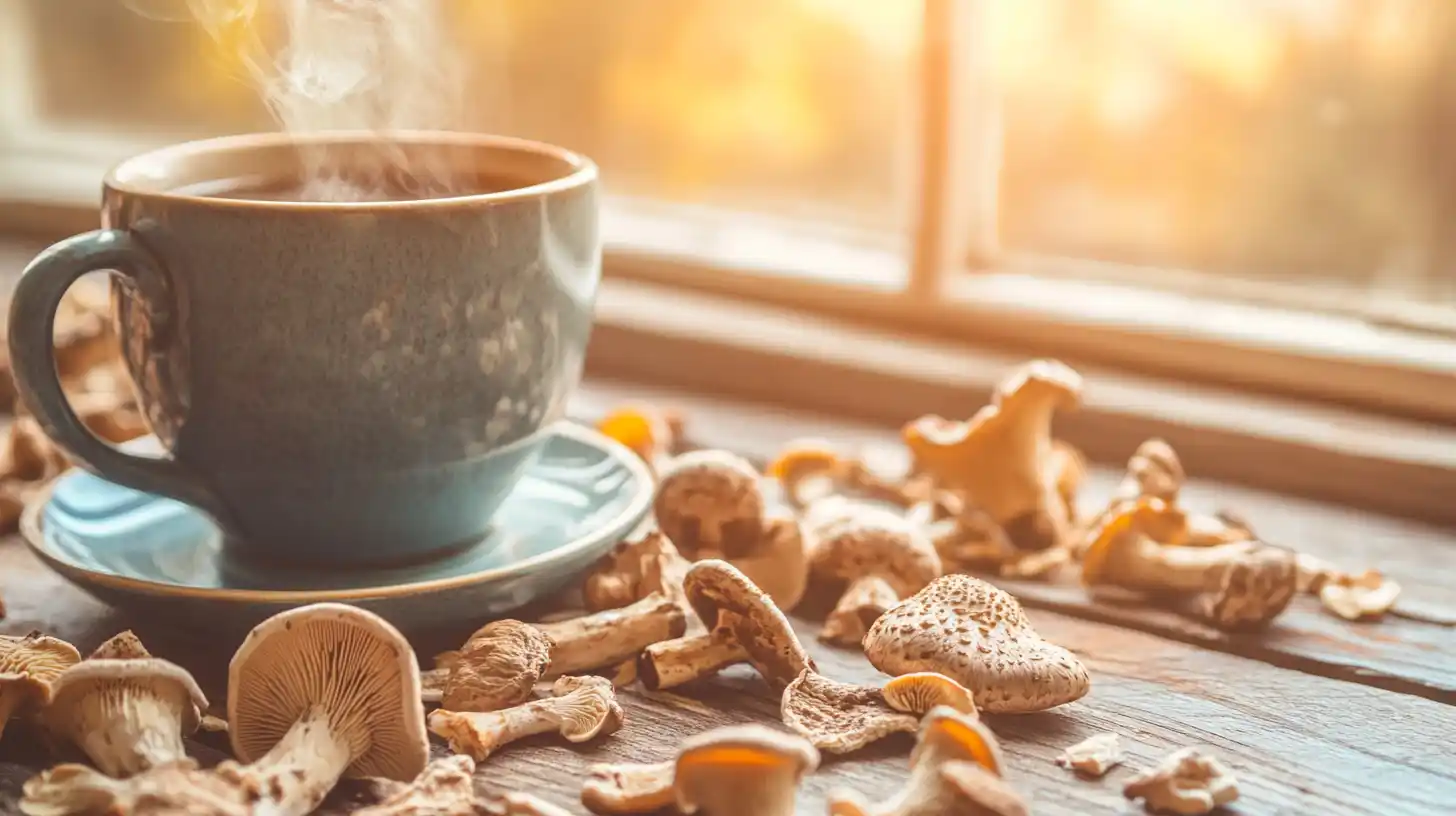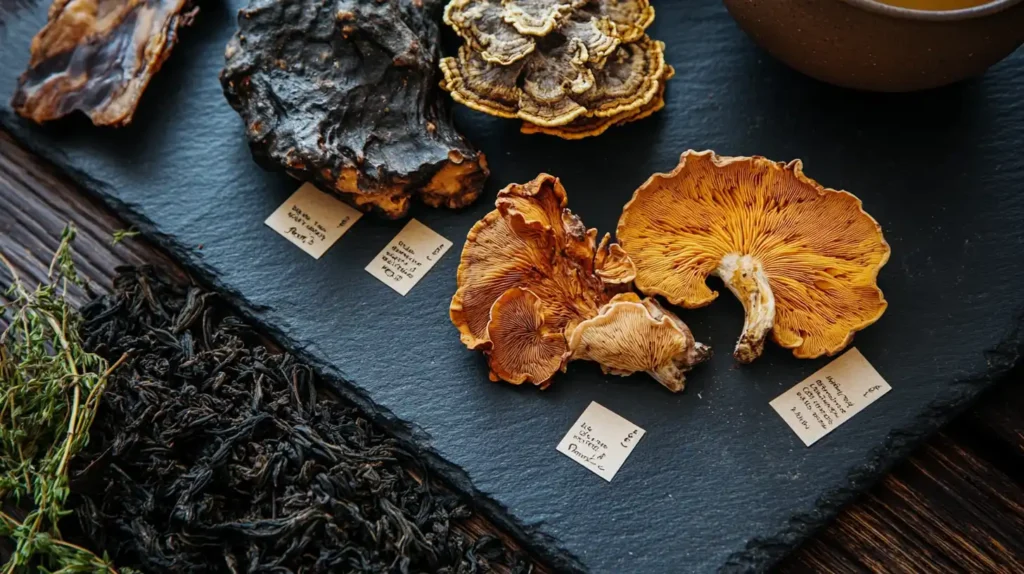
Mushroom tea is taking the wellness world by storm, but what’s the big deal? From boosting immunity and brain function to helping with weight management and energy levels, this earthy drink offers numerous potential benefits. But is it worth all the hype? In this article, we’ll dive deep into the types of mushroom tea, how they impact your body, and whether they belong in your daily routine. Get ready to learn everything you need to know about this adaptogenic wonder drink and how it could transform your health from the inside out!
Introduction to Mushroom Tea and Its Varieties
Mushroom tea might sound like a bizarre wellness trend, but it’s been around for centuries. Used in traditional medicine across Asia and Europe, it’s believed to have numerous health benefits. Today, this functional beverage is gaining popularity for its potential to improve immunity, brain health, energy levels, and more. Let’s break down what it is and what makes it so special.
What Is Mushroom Tea?
Mushroom tea is a hot beverage made by steeping medicinal mushrooms in water. Unlike the culinary mushrooms you might add to your pasta, these mushrooms—like Chaga, Reishi, and Lion’s Mane—are packed with bioactive compounds that may promote better health. The tea is known for its earthy, slightly bitter taste, but many enthusiasts sweeten it with honey or mix it with herbal teas for added flavor.
While some mushroom teas focus on a single type of mushroom, others blend multiple varieties to amplify their health benefits. Depending on the mushroom used, the tea can have different effects on the body.
Different Types of Mushroom Tea: Reishi, Chaga, Lion’s Mane, Cordyceps
There are several popular types of mushroom tea, each offering unique benefits. Here’s a quick rundown:
- Reishi Tea: Known as the “mushroom of immortality,” Reishi is famous for its calming properties. It may help reduce stress, improve sleep quality, and regulate immune function.
- Chaga Tea: This antioxidant powerhouse grows on birch trees and has been used for centuries to support immune health. It’s also known for its potential to fight inflammation and oxidative stress.
- Lion’s Mane Tea: Want to sharpen your mind? Lion’s Mane is believed to boost cognitive function and protect the brain from age-related decline. It’s often used to improve focus and memory.
- Cordyceps Tea: Known for its energy-boosting properties, Cordyceps is a favorite among athletes. It may enhance endurance and improve oxygen uptake, making it a natural pre-workout drink.
Traditional Uses of Mushroom Tea in Different Cultures
Mushroom tea has deep roots in ancient traditions. People in Asia, especially in China and Japan, have brewed mushrooms for centuries to boost their health. Siberian folklore praises Chaga as a divine gift that increases longevity and prevents illness.
Chinese healers have used Reishi mushrooms for thousands of years to enhance vitality and maintain balance. Buddhist monks relied on Lion’s Mane to improve focus and support meditation.
While Western cultures only recently embraced mushroom tea, this powerful drink has been a key part of wellness practices worldwide for generations.
How Mushroom Tea Impacts the Immune System

Mushroom tea isn’t just a trendy drink—it’s a powerhouse for your immune system. Loaded with bioactive compounds, it helps protect your body against infections, reduces inflammation, and keeps your internal systems in balance. But how exactly does mushroom tea achieve this? Let’s dive into the science behind this ancient remedy.
Boosting Immunity with Beta-Glucans
One of the key reasons mushroom tea benefits your immune system is its high content of beta-glucans. These naturally occurring polysaccharides activate white blood cells, which are essential for fighting infections. Think of beta-glucans as your body’s internal alarm system—they signal your immune defenses to kick in when threats arise.
Drinking mushroom tea, especially varieties like Chaga and Reishi, can give your immune system that extra layer of protection. According to research, beta-glucans also help regulate immune responses, reducing the risk of overactive immune conditions like allergies or autoimmune diseases.
Antioxidants and Their Role in Cellular Protection
Certain types of mushroom tea, like Chaga, are rich in antioxidants. Antioxidants combat oxidative stress, which can damage your cells over time and contribute to chronic illnesses like cancer, heart disease, and Alzheimer’s.
By drinking antioxidant-rich mushroom tea, you’re effectively reducing cell damage and promoting long-term health. Some studies suggest that antioxidants in mushrooms may even help slow down aging by protecting cells from environmental toxins and free radicals.
Supporting Gut Health for a Stronger Immune Response
Did you know that nearly 70% of your immune system is housed in your gut? Drinking mushroom tea can help balance your gut microbiome, which plays a critical role in how well your body fights off illness.
Certain mushrooms, like Turkey Tail and Lion’s Mane, contain prebiotic fibers that feed the healthy bacteria in your gut. This promotes a stronger immune system, better digestion, and improved overall health.
Mushroom Tea for Brain Health and Mental Well-being
If you’re looking for a natural way to support brain function and improve your mood, mushroom tea might be your next favorite drink. From enhancing focus to reducing stress, the benefits of mushroom tea extend to both your cognitive and emotional well-being.
Lion’s Mane: Enhancing Cognitive Function
Lion’s Mane mushroom is often referred to as “nature’s nootropic” due to its potential to improve memory, focus, and overall brain health. It contains hericenones and erinacines, compounds that stimulate the production of nerve growth factor (NGF). NGF is crucial for the growth and maintenance of neurons, which are essential for brain function.
Drinking Lion’s Mane tea regularly could help protect against cognitive decline, making it a popular choice for those looking to enhance their mental performance. It’s also being studied for its potential role in preventing Alzheimer’s disease and other neurodegenerative disorders.
Chaga’s Role in Stress Reduction
Feeling stressed? Mushroom tea can help. Chaga tea is known for its adaptogenic properties, meaning it helps your body adapt to stress more efficiently. It works by reducing the production of cortisol, the hormone responsible for the “fight-or-flight” response.
Chaga tea can promote relaxation and improve your mood, making it a great addition to your daily wellness routine. Whether you’re tackling a busy workday or winding down at night, a cup of this earthy brew can help you stay calm and focused.
How Mushroom Tea Helps Regulate Hormones
Hormonal imbalances can wreak havoc on your mental well-being, leading to mood swings, anxiety, and fatigue. Thankfully, mushroom tea varieties like Reishi are known to help regulate hormones.
Reishi tea is often used to support adrenal function, which plays a crucial role in managing your body’s response to stress. By balancing hormones naturally, mushroom tea can help improve mood stability, energy levels, and even sleep quality.
Energy, Stamina, and Athletic Performance
Ever feel like your energy levels just aren’t cutting it? Whether you’re dragging yourself out of bed or struggling through a workout, mushroom tea might be the natural pick-me-up you’ve been missing. With specific mushrooms known to boost endurance and vitality, this tea can help power your day without the crash associated with caffeine-heavy drinks.
Cordyceps: A Natural Energy Booster
One of the most talked-about mushrooms for boosting energy is Cordyceps. This fungus has been used in traditional Chinese medicine for centuries to improve stamina and reduce fatigue. But how does it work? Cordyceps is believed to increase the body’s production of adenosine triphosphate (ATP), which is essentially the fuel that powers your cells.
By improving your body’s oxygen use and energy production, Cordyceps tea can help you push through physical tasks with ease. Many athletes swear by it as a pre-workout drink to enhance endurance and performance. And the best part? Unlike coffee, it won’t leave you feeling jittery or cause a sudden energy crash.
💡 Looking for more energy-boosting recipes? Check out our guide to the best mini pancake recipes for a quick breakfast fix here.
Enhancing Athletic Performance with Adaptogens
Mushroom tea doesn’t just improve energy levels—it can also enhance athletic performance. Many mushrooms used in teas, like Cordyceps and Lion’s Mane, are classified as adaptogens, which help your body adapt to physical and mental stress.
Adaptogens help regulate the body’s stress response by balancing hormones like cortisol and reducing inflammation. This can lead to better endurance during workouts, faster recovery times, and less overall fatigue.
For anyone looking to improve their fitness routine naturally, mushroom tea offers a promising, holistic option.
Balancing Blood Sugar Levels for Sustained Energy
Another way that mushroom tea boosts energy is by helping balance blood sugar levels. Certain mushrooms, like Reishi and Chaga, have been shown to improve insulin sensitivity and reduce blood sugar spikes. This not only helps with energy management throughout the day but also reduces cravings and keeps your metabolism in check.
If you find yourself hitting an afternoon slump, swapping your usual sugary snacks or coffee for a cup of mushroom tea could be a healthier way to sustain energy levels.
Potential Risks and Side Effects of Mushroom Tea
While mushroom tea offers a range of health benefits, it’s important to be aware of potential side effects and risks. Like any supplement or herbal remedy, it’s essential to use it safely and understand what you’re putting into your body.
Common Side Effects: Nausea, Allergies, Interactions
For most people, mushroom tea is safe when consumed in moderation. However, some individuals may experience mild side effects like nausea, upset stomach, or allergic reactions. These side effects are often linked to consuming mushroom tea in excessive amounts or being allergic to fungi.
It’s also crucial to be mindful of potential drug interactions. Some medicinal mushrooms can interact with prescription medications, especially those that affect the immune system, blood pressure, or blood sugar levels. If you’re on medication, it’s best to consult with your doctor before adding mushroom tea to your diet.
💡 Wondering if mushroom tea is a good addition to your daily routine? Learn more about balancing your diet with healthy foods by visiting our cottage cheese flatbread recipe guide here.
Safe Consumption Guidelines
To avoid adverse effects, it’s important to follow some basic safety guidelines when drinking mushroom tea:
- Start slow: If you’re new to mushroom tea, start with a small amount to see how your body reacts.
- Stick to recommended doses: Avoid overconsumption. One or two cups per day is generally considered safe.
- Choose high-quality products: Make sure the mushrooms used in your tea are sourced from reputable suppliers and are free of contaminants.
Following these tips can help you enjoy the benefits of mushroom tea without any unwanted surprises.
Differences Between Medicinal and Psychedelic Mushroom Teas
It’s important to distinguish between medicinal mushroom teas and psychedelic mushroom teas. The teas discussed in this article are made from non-psychoactive mushrooms like Reishi and Lion’s Mane, which offer various health benefits without altering your perception or causing hallucinations.
On the other hand, psychedelic mushroom tea, made from mushrooms containing psilocybin, is known for its mind-altering effects. While there is ongoing research into the potential therapeutic use of psilocybin for mental health, it’s a completely different category from the medicinal teas you’ll find in most health stores.
Mushroom Tea for Skin and Anti-Aging Benefits
Mushroom tea isn’t just about boosting your energy or immunity. It may also work wonders for your skin and overall appearance. Thanks to its high antioxidant content and anti-inflammatory properties, this earthy brew might be the beauty secret you’ve been missing.
Antioxidants for Skin Health
Your skin is constantly exposed to environmental stressors like pollution, UV rays, and toxins. Over time, these stressors cause oxidative stress, leading to dull skin, wrinkles, and even premature aging. That’s where mushroom tea steps in!
Certain mushrooms, such as Chaga, are loaded with antioxidants that help combat free radicals and reduce cell damage. Regularly drinking mushroom tea can help protect your skin from the inside out, promoting a glowing, youthful appearance.
But that’s not all—mushrooms like Reishi may also boost collagen production, keeping your skin firm and reducing the appearance of fine lines. If you’re wondering “What does mushroom tea do to your body?”, the answer is clear: it’s a natural way to enhance both your health and beauty.
Anti-Inflammatory Properties
Inflammation is one of the main culprits behind many skin issues, including acne, redness, and eczema. Thankfully, many types of mushroom tea, especially Reishi and Lion’s Mane, are known for their anti-inflammatory effects.
Drinking mushroom tea may help calm inflammation throughout your body, leading to clearer, calmer skin. In addition to improving your complexion, reducing internal inflammation can also slow down the aging process, keeping your skin healthier for longer.
Weight Loss and Metabolic Benefits of Mushroom Tea

If you’re on a weight loss journey, incorporating mushroom tea into your daily routine could give you an unexpected boost. While no tea is a magic solution, the unique properties of mushrooms can support a healthy metabolism and help you manage your weight.
How Mushroom Tea Supports Weight Loss
One of the ways mushroom tea may help with weight loss is by improving insulin sensitivity and balancing blood sugar levels. This is particularly true for mushrooms like Reishi and Chaga, which have been shown to support healthy blood sugar management.
When your blood sugar is stable, you’re less likely to experience sudden cravings and energy crashes, which can often lead to overeating. By keeping your appetite in check, mushroom tea can help you stay on track with your weight loss goals.
Additionally, adaptogenic mushrooms may reduce stress, which can play a significant role in weight gain. Stress often triggers the body to produce more cortisol, a hormone that promotes fat storage, especially around the belly. By reducing stress, mushroom tea may help manage your weight more effectively.
💡 Tip: For more healthy ideas to balance your meals and avoid cravings, check out our guide to making cottage cheese flatbread here.
Improving Metabolism with Adaptogens
Adaptogenic mushrooms like Cordyceps may also give your metabolism a much-needed boost. These mushrooms work by increasing oxygen uptake and cellular energy production, helping your body burn calories more efficiently.
Unlike harsh stimulants found in some weight loss supplements, mushroom tea offers a gentle, natural way to rev up your metabolism without causing jitteriness. It’s a healthier alternative to sugary energy drinks or crash diets.
If you’ve been wondering “What does mushroom tea do to your body?”, the answer goes beyond immunity and brain health. It may also help you achieve your weight loss and fitness goals while promoting better overall well-being.
FAQs Section
Many people have questions when it comes to adding mushroom tea to their daily routine. Is it safe to drink every day? Can it help with specific health goals? Below, we’ve answered some of the most common queries to help you make informed decisions about this powerful drink.
1. Is It Safe to Drink Mushroom Tea Every Day?
Yes, for most people, drinking mushroom tea daily is considered safe, as long as it’s consumed in moderation. Medicinal mushrooms like Reishi, Chaga, and Lion’s Mane are generally well-tolerated. However, it’s important to pay attention to your body’s response, especially if you have underlying health conditions.
If you’re on medications—particularly blood thinners or immune suppressants—you should consult a doctor before making mushroom tea a daily habit. While mushroom tea offers plenty of health benefits, consuming it in excessive amounts could lead to unwanted side effects like nausea or an upset stomach.
2. What Organ Is Mushroom Good For?
Mushrooms benefit several organs, but they are especially good for the immune system and brain. Varieties like Reishi help regulate immune responses, while Lion’s Mane supports cognitive function by promoting the production of nerve growth factor (NGF), which helps maintain healthy brain cells.
In addition to these, mushrooms like Chaga are also beneficial for the liver. They help detoxify the body and protect the liver from oxidative stress, reducing the risk of long-term damage.
3. Is Mushroom Good for Weight Loss?
Yes, mushroom tea can support weight loss in a few different ways. It helps regulate blood sugar levels, preventing sudden cravings that often lead to overeating. Additionally, adaptogens found in mushrooms like Cordyceps can help manage stress, which is a common factor in weight gain.
By boosting your metabolism and helping your body handle stress better, mushroom tea offers a natural way to support a healthy lifestyle without relying on extreme diets.
4. How Many Cups of Mushroom Tea Should You Drink a Day?
The recommended daily intake of mushroom tea is usually one to two cups. Starting with a smaller amount is wise if you’re new to it, allowing your body to adjust. You can gradually increase your intake once you know how it affects you.
It’s important to note that different mushroom types have unique effects. For example, Reishi is calming and best consumed at night, while Cordyceps is more energizing and ideal in the morning or before a workout.
Conclusion – Should You Include Mushroom Tea in Your Diet?
After exploring the many health benefits of mushroom tea, it’s clear that this ancient drink offers much more than a warm, earthy beverage. But the question remains: What does mushroom tea do to your body?
Simply put, mushroom tea provides a natural boost to your immune system, brain health, energy levels, and even your skin. It’s a holistic remedy that supports overall well-being without the jitters of coffee or the sugar crash from energy drinks.
Recap of Health Benefits
Here’s a quick recap of why you might want to make mushroom tea a regular part of your routine:
- Immune Support: Strengthens your body’s defenses with beta-glucans and antioxidants.
- Brain Health: Enhances focus, memory, and cognitive performance with Lion’s Mane.
- Energy Boost: Naturally boosts stamina and reduces fatigue with Cordyceps.
- Weight Loss: Helps regulate blood sugar levels and manage stress-related weight gain.
- Skin Benefits: Promotes a youthful glow and fights signs of aging with antioxidants.
While mushroom tea is not a cure-all, it’s a valuable addition to a balanced diet and wellness routine. Whether you’re looking to strengthen your immune system, improve mental clarity, or just try something new, this unique drink is worth considering.
Considerations for Different Individuals
Mushroom tea may not be suitable for everyone. Pregnant or breastfeeding women, individuals with allergies, or those on certain medications should be cautious. As always, it’s a good idea to consult with a healthcare professional before starting any new supplement.
For most people, however, the benefits of mushroom tea far outweigh any potential risks. If you’re curious about its effects, start slow and see how your body responds.
In conclusion, mushroom tea offers a natural, holistic way to support your body. Whether you’re aiming to boost your energy, improve your focus, or strengthen your immunity, this ancient remedy is a simple way to promote overall wellness.

